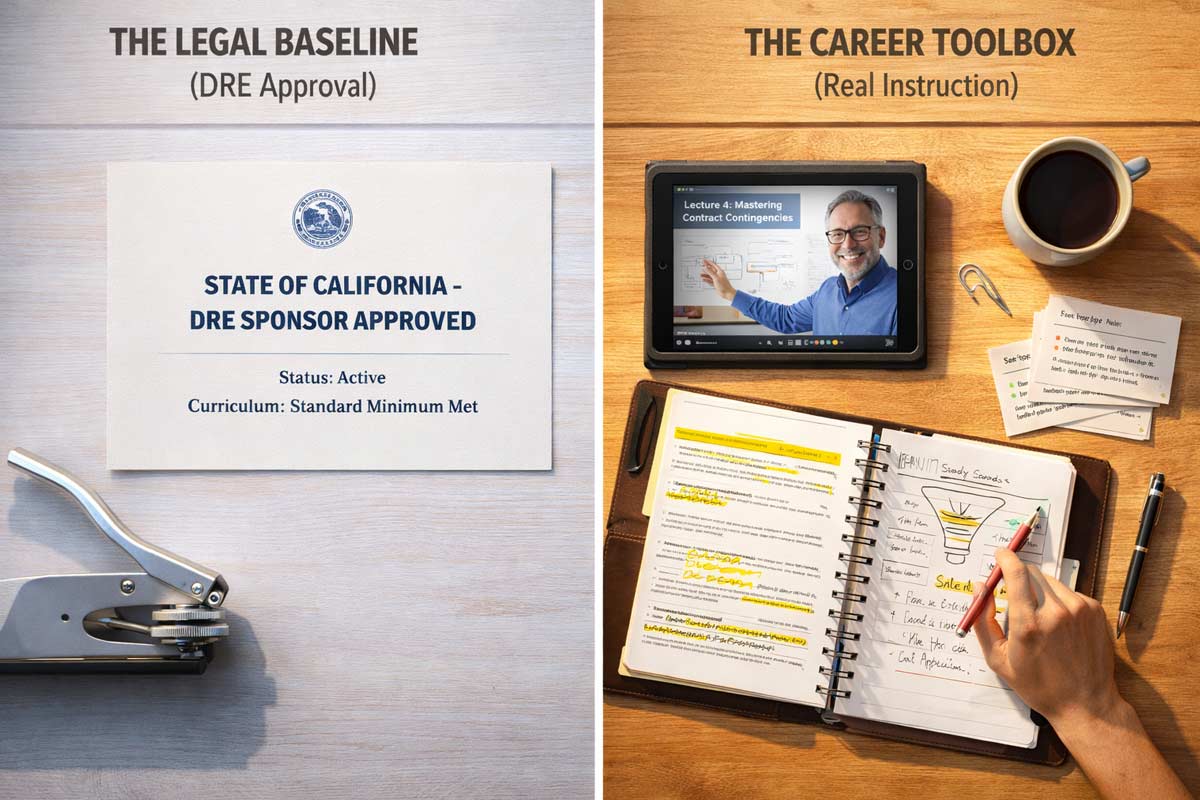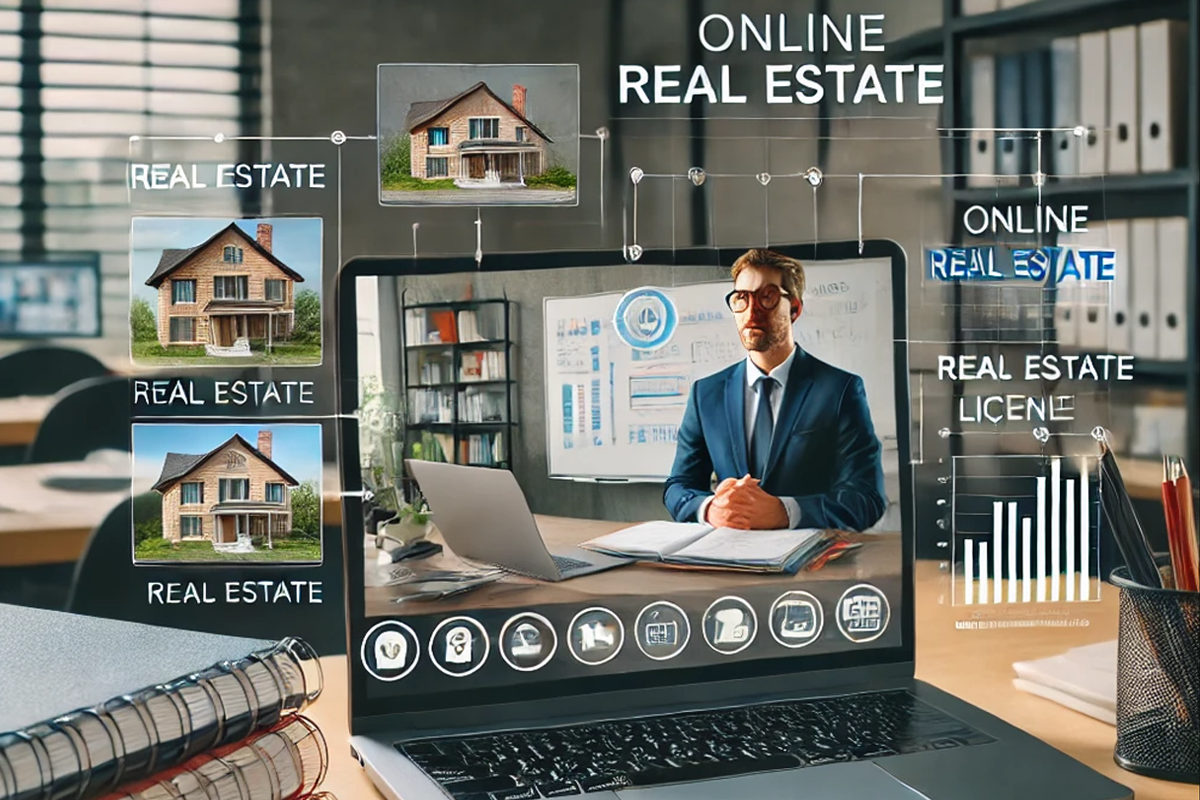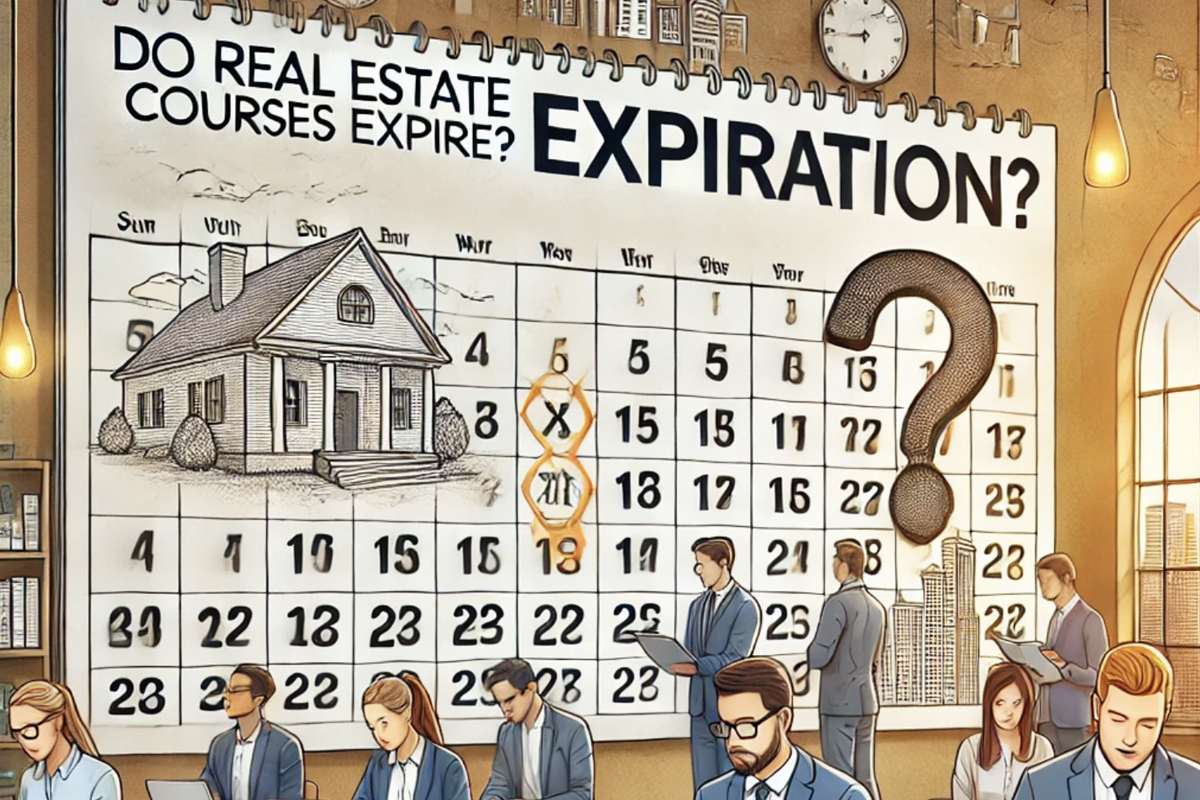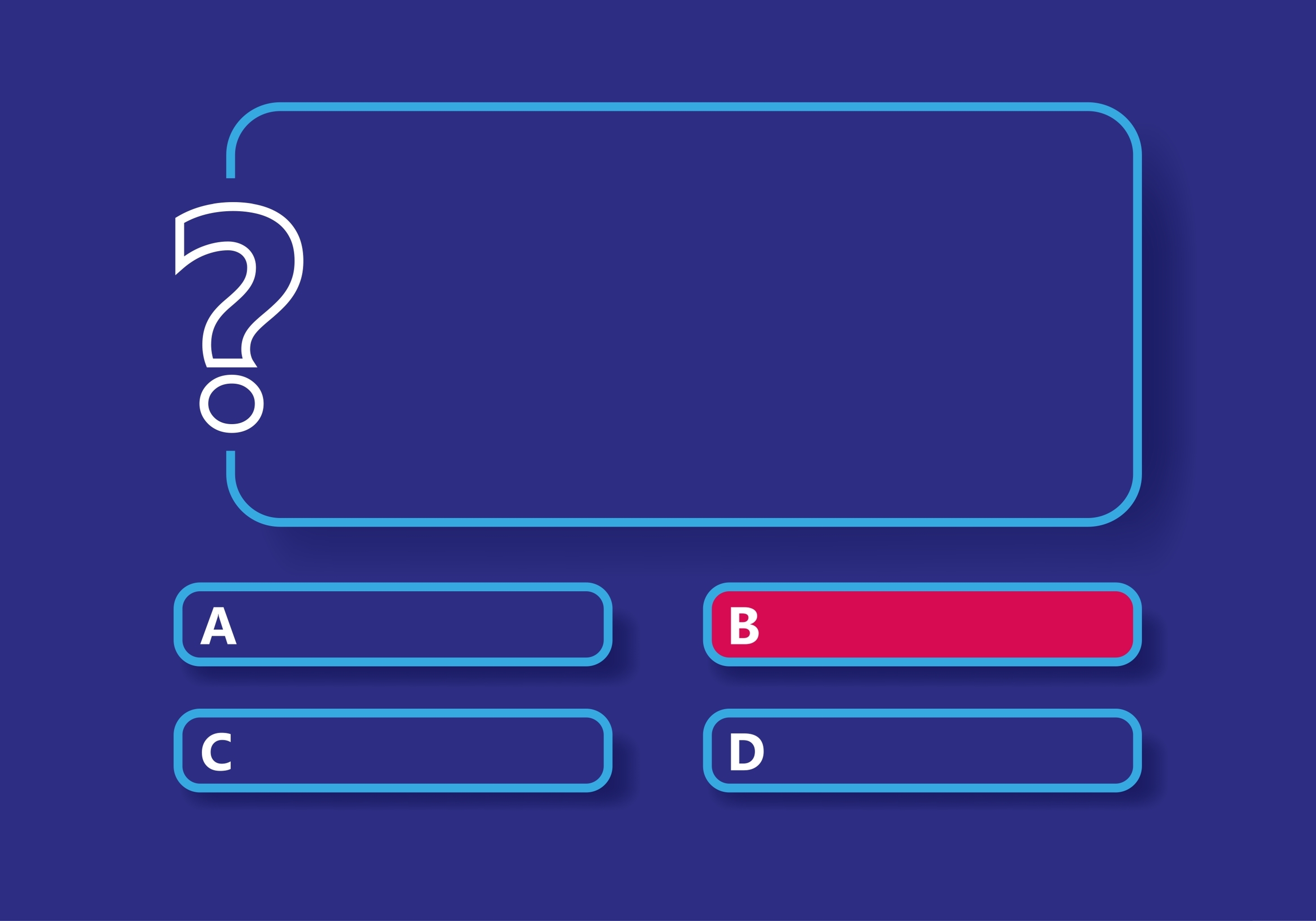
Selecting a real estate school is the first professional decision you will make in your new career. It is often the difference between getting licensed in six months or being stuck in a cycle of retakes Read more...
Selecting a real estate school is the first professional decision you will make in your new career. It is often the difference between getting licensed in six months or being stuck in a cycle of retakes and frustration two years from now.
Many prospective agents choose a school based solely on the lowest price or the flashiest marketing promise. However, a "cheap" course becomes expensive very quickly if the materials are outdated, the support is non-existent, or the curriculum fails to prepare you for the California Department of Real Estate (DRE) state exam.
Most students who come to us after failing elsewhere don’t lack effort—they lacked access to real instruction. After 20 years of helping students navigate this process, I’ve learned that the "best" school isn't a universal title—it’s the one that prioritizes actual learning over marketing optics.
Quick Take: The 30-Second Summary
Verify Legal Standing: Confirm a valid DRE Sponsor ID before looking at anything else.
Prioritize Support: Access to a human instructor is the primary factor in passing the first time.
Evaluate Exam Prep: Look for depth and rationales, not just a bank of "A, B, C, D" questions.
Scrutinize Policies: Treat "guarantees" as fine-print audits rather than quality indicators.
Step 1: Confirm the Legal Baseline (DRE Approval)
In California, you cannot sit for the state exam unless you complete three college-level courses from an approved provider. DRE approval is the absolute minimum legal requirement—it is not a rating of quality. It simply means the school has permission to offer the curriculum.
How to verify in minutes:
Ask the school for their DRE Sponsor ID.
Visit the DRE website to confirm their status is "Approved."
Check if they offer the three mandatory courses: Real Estate Principles, Real Estate Practice, and an elective.
To understand why this approval is just the starting line, read our guide on What Makes a Real Estate School DRE-Approved?
Step 2: Decide What Kind of Student You Are
The format of the school should match your lifestyle, not the other way around. A "self-paced" course is only a value if you have the discipline to finish it without a structured environment.
Learner Profile
Priority
Recommended Feature
The Full-Time Professional
Efficiency
High-quality mobile interface & clear PDF materials.
The Anxious Test-Taker
Stability
Live webinars or in-person coaching components.
The Fast-Tracker
Support
Responsive administrative teams for finishing certificates.
The Career Switcher
Practicality
Instructors who provide context through California examples.
Real-World Scenario: Many students choose a purely digital format because it's cheaper, only to realize months later they’ve stopped making progress because they have no one to ask for clarification.
Step 3: Instructor Access is the Hidden Difference-Maker
Many online schools are essentially "digital bookstores." They sell you the material and leave you to navigate it alone.
If you hit a wall while studying Agency or Valuation, you need a human answer. In high-volume, low-support environments, you might wait days for a canned email response. This delay kills your momentum.
When evaluating a school, ask: “If I don’t understand a concept, can I reach out to an instructor, or am I limited to a help-desk ticket?”
Instructional depth is what prevents failure. You can learn more about this in our guide on The Role of Instructors in CA Real Estate Education.
Step 4: Evaluate Prep Quality (Beyond the "Guarantee")
The goal is to pass the state exam on your first attempt. High-quality exam prep is about feedback loops, not just repetition.
The Baseline: A school that only gives you a score at the end of a quiz.
The Standard: A program that provides a detailed rationale for every answer (explaining why the correct answer is right and the others are wrong).
Scrutinizing the Guarantee:
Many schools market a Pass Guarantee. It is important to view these as administrative policies rather than trust signals. A guarantee is effectively a "post-failure" plan; it does not indicate the quality of the instruction itself. Often, the fine print requires multiple failures or specific prerequisites to qualify. Focus on the quality of the practice rationales—that is what keeps you from needing the guarantee in the first place.
Step 5: Know When a Crash Course Helps (and When It’s a Trap)
A crash course is a "gap-closer," not a foundation. If the primary pre-licensing courses were low-quality, a weekend session cannot replace 135 hours of lost learning.
The Readiness Benchmark: If you are scoring 70–75% on practice exams, a crash course can provide the "test-taking logic" to secure a pass. If you are scoring 50%, you likely need to revisit the core material.
For more on timing your prep, see: Are Crash Courses Worth It in California?
Step 6: Compare Total Cost & Friction
The "sticker price" of a real estate school is rarely the final cost. Look for "friction points" that lead to hidden expenses:
Extension Fees: Charges if you don't finish the course within a strict window.
Retake Fees: Fees for re-taking a course final exam.
Tech Friction: Outdated portals that don't work well on mobile or modern browsers.
Insider Tip: If a school’s support is slow during the enrollment process, it will likely be slower when you are waiting for your course completion certificates.
Step 7: The Simple Decision Checklist
Use this rubric to evaluate providers. Score them based on substance, not marketing.
DRE Approved: Verified Sponsor ID (Non-negotiable).
Direct Instructor Access: Can I get a human on the phone or email?
Feedback Loops: Does the exam prep explain the "why" behind the answers?
Policy Clarity: Are refund and retake policies written in plain English?
Format Fit: Does this match my actual daily schedule?
Frequently Asked Questions
Do I really need an exam pass guarantee?
Guarantees are secondary to instructional quality. A guarantee is relevant only after you have failed. Your priority should be finding a school with active instructor support and robust practice rationales—the tools that help you pass the first time.
Does DRE approval mean the school is "good"?
No. DRE approval only means the school meets the minimum legal curriculum requirements. It is a baseline for entry, not a measure of how well the school prepares you for a career or the state exam.
What should I prioritize if I work full-time?
Prioritize "support responsiveness." When your study time is limited to late nights or weekends, you cannot afford to wait days for a response to a question. You need a school that provides the resources to keep you moving forward.
Take the Next Step
Choosing a real estate school is about finding a partner for your licensure journey. A great school makes guarantees mostly irrelevant because the instruction is designed to help you pass the first time. To see how different programs compare across the state using this objective framework, view our guide to the best real estate schools in California.
|

Choosing the right real estate license school is a major step for anyone looking to succeed in California’s real estate market. A good real estate school will do more than teach you facts; they lay the Read more...
Choosing the right real estate license school is a major step for anyone looking to succeed in California’s real estate market. A good real estate school will do more than teach you facts; they lay the groundwork for your career. In California, to become a licensed real estate agent, you must pass a state exam that tests your knowledge and readiness to work professionally.
Your school should teach you about real estate laws, how to help clients buy and sell properties, and how to act ethically in your job. The education you get not only helps you pass your exam but also prepares you to face the challenges and grab the opportunities in the real estate world. So, picking the right school is crucial because it shapes your future as a professional agent.
The Importance of Accreditation
Accreditation is another crucial factor to consider when selecting a real estate license school. Accredited schools like ADHI Schools have been reviewed and validated for quality and efficacy by the Department of Real Estate. This isn’t just about meeting minimum standards; accreditation is a seal of quality that ensures the education you receive will be respected and recognized. It also signals to employers and clients that you have been trained under rigorous educational standards, boosting your credibility and professional standing in the competitive real estate industry.
Benefits of Online and Online “Live” Real Estate Courses
Online real estate courses offer several advantages, particularly in terms of flexibility, accessibility, and self-paced learning. These courses are ideal for those who have busy schedules or who live far from traditional classroom locations. They allow students to access materials at any time and from anywhere, making it easier to fit learning into a hectic lifestyle. Standout features of our online courses often include:
Video Tutorials: Engaging video lessons that can be paused and replayed, helping you to understand complex topics at your own speed.
Interactive Modules: Interactive learning experiences that keep you engaged and test your knowledge as you progress.
Mobile-Friendly Platforms: The ability to study on the go with courses optimized for smartphones and tablets, ensuring you can learn even when you’re away from your computer.
Hybrid Learning Options
Hybrid courses combine the best aspects of online and classroom learning. These programs typically involve a mix of online coursework to cover theoretical knowledge and scheduled in-person sessions for more practical, hands-on training. This format can be particularly beneficial as it offers:
Flexibility and Interaction: You can enjoy the flexibility of online learning while still benefiting from the interpersonal and experiential advantages of traditional classroom attendance.
Balanced Structure: The structure of hybrid models provides a balanced approach, catering to different learning preferences and needs.
The Value of Experienced Instructors
The experience and teaching styles of instructors at a real estate license school play a critical role in shaping the quality of education. Experienced instructors bring a wealth of real-world knowledge to their teaching, offering insights that go beyond textbooks and theoretical concepts. They are often well-versed in the latest industry trends and regulatory changes, which can provide students with a more comprehensive understanding of the real estate landscape.
Teaching style also significantly impacts learning outcomes. Instructors who employ interactive and adaptive teaching methods can cater to various learning styles, ensuring that all students grasp complex topics. This versatility is crucial for effectively preparing students for the varied scenarios they will encounter on the real estate exam and in their future careers.
The presence of knowledgeable instructors is particularly important for real estate exam success. These professionals can pinpoint the most important content that is likely to appear on the exam and provide students with strategies to tackle difficult questions. Moreover, their ability to clarify doubts and provide real-time feedback is invaluable in building confidence and competence among students.
CrashCourseOnline.com
CrashCourseOnline.com offers a unique advantage in real estate exam preparation with its comprehensive suite of study tools designed specifically for California real estate licensure. What sets CrashCourseOnline.com apart includes:
Tailored Content: All resources are specifically designed to meet the requirements of the California real estate exam, ensuring that students study the most relevant and up-to-date information.
Interactive Learning Tools: The platform includes interactive features like practice quizzes and real-time feedback, which help reinforce learning and build confidence as students see their progress.
Accessibility and Flexibility: With courses and materials available online, students can prepare on their schedule and at their pace, which is crucial for adult learners who may be balancing other responsibilities.
Expert Guidance: CrashCourseOnline.com provides access to seasoned real estate educators who offer live exam prep sessions. These sessions delve into exam strategies, breakdown challenging areas, and answer student questions in real time, providing a level of personalized preparation that can be hard to find elsewhere.
By using these preparation materials and engaging with platforms like CrashCourseOnline.com, students can greatly enhance their chances of success on the California real estate exam. The comprehensive resources and expert guidance available can give them a competitive edge in a challenging field.
Choosing the right real estate license school is a pivotal decision that can impact your career for years to come. As you make this decision, consider the following key factors:
Accreditation and DRE Approval: Ensure that the school is approved by the California Department of Real Estate and accredited by relevant authorities.
Learning Formats: Reflect on whether online, classroom-based, or hybrid learning environments suit your learning style and schedule best.
Experienced Instructors: Look for schools with knowledgeable and experienced instructors who can provide not only the curriculum but also valuable industry insights.
Support Resources: Evaluate the availability of student support services such as tutoring, forums, and dedicated staff to help you through your studies.
Exam Preparation: Consider the quality and effectiveness of the exam preparation materials offered, such as mock exams, study guides, and live prep courses.
It’s essential to do thorough research and choose a school that aligns with your career goals and educational needs. Take the time to read reviews, talk to alumni, and perhaps attend a few introductory sessions or webinars to get a feel for the school’s environment and offerings.
Ready to take the first step towards a successful career in real estate? Enroll today at ADHI Schools or start your preparation with CrashCourseOnline.com.
Love,
Kartik
|

How Long Does the California Real Estate Exam Take?
If you’re planning to become a real estate agent in California, one of the key steps is passing the California real estate exam. Knowing how long Read more...
How Long Does the California Real Estate Exam Take?
If you’re planning to become a real estate agent in California, one of the key steps is passing the California real estate exam. Knowing how long the exam will take helps in preparing effectively and managing your time on the day of the test. This article will cover everything you need to know about the duration of the exam and how to approach it efficiently.
Total Duration of the Exam
The California real estate exam is designed to test your knowledge in various real estate topics, including property ownership, laws, valuation, financing, and contracts. For the sales license exam, it consists of 150 multiple-choice questions, and you are given up to 3 hours to complete it. This means you have about 1 minute and 11 seconds per question on average. It’s a manageable pace if you're prepared, but rushing or spending too much time on a single question can impact your ability to finish the exam.
For those taking the broker exam, it is longer, consisting of 200 multiple-choice questions with 4 hours allotted to complete the exam.
Breakdown of the Exam:
Sales License Exam:
Number of Questions: 150 multiple-choice questions.
Time Allotted: 3 hours (180 minutes).
Broker Exam:
Number of Questions: 200 multiple-choice questions.
Time Allotted: 4 hours (240 minutes).
Key Considerations
Here are some tips to manage your time during the exam:
Practice Time Management: When practicing for the exam, completing practice tests within the time limit is crucial. This builds comfort with the pacing and prepares you for the actual test day. Our blog on Effective StudyTechniques for the Real Estate Exam offers additional insights and strategies.
Skip and Return to Hard Questions: If you encounter a tough question, it’s often better to move on and come back to it later. This approach ensures you don't waste too much time on any single question and that you cover more ground.
Read Questions Carefully: While keeping an eye on the clock, make sure to read each question thoroughly. Misreading can lead to easy mistakes.
Watch the Clock: Monitoring your time can help adjust your strategy on the fly, ensuring you answer as many questions as possible. Our additional resources provide tactics on maintaining a good pace throughout the test.
What Happens After the Exam?
Once you’ve completed the exam, the next step is to wait for your results. The California Department of Real Estate (DRE) typically provides results at the time the test is concluded, but sometimes it could take a few days.
The California real estate exam is a comprehensive test that requires thorough preparation and good time management. With different durations for the sales license and broker exams, it’s important to practice completing sample exams within the time limits to ensure you’re comfortable with the pacing. By preparing effectively, you’ll increase your chances of passing the exam and moving closer to your goal of becoming a licensed real estate agent.
|

Recent Changes to the California Real Estate License Exam
The California Department of Real Estate (DRE) has recently implemented changes to the real estate license exam, which may impact how Read more...
Recent Changes to the California Real Estate License Exam
The California Department of Real Estate (DRE) has recently implemented changes to the real estate license exam, which may impact how you prepare and take the test. Over the past few months, the DRE has stopped providing calculators and whiteboards during the exam. This shift means that test-takers will need to adjust their strategies to succeed without relying on these tools.
What This Means for You
No Calculators: The removal of calculators means you will have to complete any math-related questions manually. While there are hardly any math problems in the real estate exam, it’s still important to practice solving basic calculations, such as determining commission splits, prorations, or property taxes, without a calculator.
No Whiteboards: Previously, whiteboards were provided for taking notes or working through questions. Without them, you’ll need to rely on mental calculations and keep track of important points without jotting them down. This change highlights the importance of sharpening your memory and mental math skills during preparation.
How to Prepare for the California Real Estate Exam Without Calculators or Whiteboards
To succeed under these new conditions, follow these tips:
Practice Mental Math: Get comfortable doing basic real estate calculations in your head or on scratch paper. You can practice solving simple math problems regularly to ensure you’re prepared for the exam.
Memorize Key Formulas: Memorizing common real estate formulas (such as commission calculations, loan-to-value ratios, and property tax estimations) will help you tackle math questions confidently without needing a calculator.
Focus on Conceptual Understanding: The real estate exam is not just about numbers; it’s also about understanding important concepts such as property law, real estate finance, and contracts. The better you understand these topics, the more you can rely on your knowledge, even in math-related questions.
Take Mock Exams: Practice real estate exams are a great way to prepare under the new conditions. These simulations can help you get used to solving problems without additional tools and will give you a better sense of your readiness for test day.
How to Pass the California Real Estate Exam
Passing the California real estate exam requires more than just adjusting to the new no-calculator and no-whiteboard rules. Here are some key strategies to increase your chances of success:
Thoroughly Review the Course Material: A solid understanding of the topics covered in your real estate courses is crucial. Make sure you go over everything from property management to ethics and legal issues.
Attend Our Crash Course: Consider enrolling in our real estate crash course that focuses on exam preparation. These intensive reviews can sharpen your knowledge and fill any gaps before test day.
Take Multiple Mock Exams: Aim to consistently score above 80% on your practice tests. This will ensure you’re prepared and confident about your understanding of the material.
Stay Calm and Focused: Test anxiety can affect your performance, so be sure to approach the exam with confidence and a clear mind. Practice mindfulness or relaxation techniques leading up to the exam.
The recent changes to the California real estate license exam may seem daunting, but with the right preparation, you can still succeed. Focus on understanding key concepts, practice solving math problems manually, and simulate exam conditions to ensure you're ready.
Remember, passing the exam is just the first step toward a successful real estate career. Stay persistent and dedicated, and you’ll be well on your way to becoming a licensed real estate agent in California.
Love,
Kartik
|

Passing the California real estate exam on your first attempt is a milestone that sets the tone for your entire career. Every day, students ask me some version of the same question:
“What’s the Read more...
Passing the California real estate exam on your first attempt is a milestone that sets the tone for your entire career. Every day, students ask me some version of the same question:
“What’s the fastest, most reliable way to pass the real estate exam the first time?”
The answer isn’t mysterious.
Success comes from preparation, strategy, and understanding how the exam actually works. If you want the big-picture roadmap—everything from application requirements to how scoring works—start with our California Real Estate Exam Guide. It gives you the full context before you dive into the specifics.
With that foundation in place, let’s walk through the proven strategies that help first-time test-takers succeed.
Understanding the Challenge
Many aspiring agents wonder, “Is the California real estate exam hard?”
It can feel challenging — but mostly because the Department of Real Estate (DRE) tests judgment as much as knowledge.
It isn’t enough to memorize definitions. You must understand how to apply California-specific laws, disclosures, ethics, and principles to scenario-based questions.
In fact, relying too heavily on memorization rather than comprehension is one reason why people fail the real estate exam to begin with.
Choose the Right School
Your choice of real estate school determines whether you barely scrape by—or whether you build the depth of understanding required to pass confidently on test day.
The right school provides:
Experienced instructors who understand how the DRE thinks
Comprehensive materials aligned to the DRE’s official exam blueprint
Ongoing support, practice testing, and review tools
A strong instructional foundation improves your odds of passing dramatically.
Why a Crash Course Is Your “Turbo Boost”
A real estate crash course is like activating a turbo boost in a video game — fast, focused, and designed to maximize performance right before the final challenge.
Just as a sprinter trains intensely before a major race, a crash course helps sharpen your recall, solidify your understanding, and tighten your exam-day strategy.
In the ADHI Schools crash course, you get:
Deep coverage of high-value DRE exam topics
Real exam-style practice questions
Insights into how the DRE frames distractor answers
Strategies to eliminate wrong choices under pressure
A Study Strategy Designed for a First-Time Pass
Here’s the blueprint our most successful first-time pass students follow:
1. Study Consistently — Not Sporadically:
Short, regular study sessions beat cram sessions every time.
Build a schedule that rotates through all seven DRE content categories.
2. Use Practice Tests to Build Exam Awareness:
Practice tests help you:
Identify weak spots
Build familiarity with four-option multiple choice
Learn common test traps.
3. Understand Key Concepts Deeply
The DRE expects mastery of critical areas including:
Property ownership forms
Agency law and mandated disclosures
Financing and appraisal
Contracts and transfer of property.
Surface-level memorization isn’t enough.
You need to apply the concepts.
4. Stay Updated on California Law:
Unlike many states, California has no national portion — everything is state-specific.
Rules around:
Agency
Disclosures
Fair housing
Real estate practice
…can evolve. Always use current study materials like those from ADHI Schools
Managing Exam Day With Confidence
Even highly prepared students slip due to nerves.
Here’s how to stay in control:
Arrive early to avoid last-minute stress
Read carefully, especially for trap words like “NOT,” “EXCEPT,” or “ALWAYS”
Manage your time — answer all questions and return to difficult ones later
Knowing that the DRE allows unlimited attempts within your two-year application window often gives students the mental space they need to perform better on attempt #1.
You Can Absolutely Pass on Your First Try
Passing the California real estate exam the first time is completely achievable.
Your results will directly reflect:
Your preparation
Your study strategy
Your ability to use the highest-quality resources
Your mindset on exam day
Approach your journey with intention, structure, and confidence — and you’ll be well on your way to becoming a licensed California real estate professional.
You've got this.
Frequently Asked Questions
1. Is the California real estate exam actually hard? Yes, it is challenging because it tests judgment, not just memorization. The state pass rate hovers around 50%, but with consistent study and a focused crash course, passing on the first attempt is very achievable.
2. What happens if I fail the real estate exam the first time? Don’t panic—you can retake it as many times as you need within your two-year application window. You simply have to pay a re-examination fee and schedule a new date. There is no waiting period enforced by the DRE other than the time it takes to get back on the schedule.
3. How long should I study before scheduling my exam? Most successful students spend 2–4 weeks consistently reviewing material after finishing their college-level courses. We recommend scheduling your exam date first to create a deadline, then working backward with a daily study plan and a crash course right before test day.
4. Can I bring a calculator to the exam? Yes, but it must be a basic, silent, battery-operated, non-programmable calculator that does not have a print-out capability or an alphabetic keyboard. You cannot use the calculator on your phone.
5. How many questions do I need to get right to pass? There are 150 questions on the salesperson exam, and you need a score of 70% to pass. That means you need to answer at least 105 questions correctly. You have 3 hours and 15 minutes to complete the test.
|

How Long Are California Real Estate Courses Valid?
For those considering becoming a real estate agent in California, several questions come to mind. One of the most common being: "Is a California Read more...
How Long Are California Real Estate Courses Valid?
For those considering becoming a real estate agent in California, several questions come to mind. One of the most common being: "Is a California real estate license worth it?" After all, you have to take some classes, study and pass and exam and obtain the license.
What if you want to dip your toe in the water and sign up for real estate school, but aren’t quite ready to apply for your license?
The good news is that once you complete your real estate courses, they don’t expire. You can take the exam whenever you're ready, as long as the rules don’t change.
Choosing the Right Real Estate School
Selecting a reputable real estate school like ADHI Schools is crucial. We are recognized for meeting the educational standards required by the state, ensuring that you're well-prepared not only for the exam but also for your future career in real estate.
Stay Updated with Legislative Changes
While the real estate courses don't expire, it's still important to keep an eye on changes in the law that might affect the validity of the courses. For example, a new law called Senate Bill 1495 (SB 1495) was introduced and took effect on January 1, 2024. This law added new requirements to the Real Estate Practice course, including topics on implicit bias and fair housing laws. These topics are designed to help you understand the underlying biases affecting housing decisions and learn the laws ensuring housing fairness.
If you plan to take your licensing exam after January 1, 2024, you must have completed a course that includes these new topics. If your previous courses didn't include these, you will have to retake this course.
Why It Matters
Choosing a school that stays updated with the latest legal requirements is essential. We ensure that our curriculum is always aligned with the latest laws, helping you avoid surprises when you decide to take your exam.
While the courses you take are valid indefinitely under current regulations, the requirements for becoming a licensed real estate agent can and sometimes do change. Being proactive and informed about these changes and choosing a reputable school can significantly impact your career.
Even Though the Education Doesn’t Expire - Apply for Your License Promptly
Once you've completed your real estate courses, it's crucial to take the next step and apply for your license without delay. Procrastination can be a significant hurdle. Lots of students, filled with relief and satisfaction after finishing their coursework, might feel tempted to take a break before applying for the license. However, delaying this critical step can lead to unnecessary setbacks.
Applying for your license immediately after completing your courses has several benefits. Firstly, the information you've learned is still fresh in your mind, which can be advantageous when taking the licensing exam. Secondly, beginning your career sooner rather than later allows you to capitalize on the momentum and enthusiasm you've built up during your studies with ADHI Schools.
Moreover, getting licensed quickly enables you to enter the real estate market when your drive is at its peak, potentially leading to a more successful start. Delaying the process might not only diminish your preparedness but could also impact your motivation and the likelihood of pursuing a career in real estate altogether.
In essence, treat the completion of your courses not as the finish line, but as a springboard into your real estate career. By applying for your license promptly, you ensure that you maintain the momentum necessary for a successful transition from student to practicing agent. Remember, in real estate, timing is everything, and the sooner you start, the sooner you can begin shaping your successful career.
In the end, a California real estate license is valuable, especially when you are well-prepared with the right education from the right real estate license school.
TLDR: Courses don’t expire in California, but sometimes the requirements to get a license change.
|

Is the California Real Estate Exam Multiple Choice?
If you're considering a career in real estate in California, attending a California real estate school will prepare you for an important milestone: Read more...
Is the California Real Estate Exam Multiple Choice?
If you're considering a career in real estate in California, attending a California real estate school will prepare you for an important milestone: the California real estate exam. Many aspiring agents ask: "Is the California real estate exam multiple choice?" This is often asked alongside the question of “How hard is the California real estate exam?”
Let's examine the exam's structure and discuss the advantages and disadvantages of being a multiple-choice test.
Structure of the California Real Estate Exam
The California real estate exam is indeed a multiple-choice test. This format assesses your knowledge and understanding of California real estate principles and laws. When you enroll in a real estate school in California like ADHI Schools, you'll be trained to tackle this exam, which is crucial for obtaining your real estate license.
The sales license exam consists of 150 questions (the broker test in California has 50 more); you are given three hours to complete it (four hours for the broker exam). The questions cover a wide range of topics, including property ownership, land use controls and regulations, valuation and market analysis, property disclosures, contracts, financing, and much more. This comprehensive test requires a solid understanding of all these areas, which is why attending a reputable real estate school like ADHI Schools is beneficial.
Pros of Multiple Choice Exams
Straightforward and Fast to Answer: Multiple-choice questions allow for quick answers. You select the option that best fits the question. This can make the testing process faster and less subjective than essay-type questions.
Objective Grading: One of the most significant advantages of multiple-choice tests is their objectivity in grading. Since the answers are fixed, there is no room for bias, and scoring is clear-cut.
Covers Broad Material: Multiple-choice exams can cover a more comprehensive range of topics than other exams, ensuring a thorough assessment of a candidate's knowledge.
Cons of Multiple Choice Exams
Guesswork: One downside is the possibility of guessing. Test-takers might select the correct answer by chance without truly understanding the material.
Test-Taking Strategies Over Knowledge: Sometimes, students focus more on mastering
test-taking strategies than on the actual content. This can lead to a lack of deep understanding of real estate principles.
Limited Depth of Knowledge Testing: Multiple-choice questions often test recognition of facts rather than a deep understanding. This can be a drawback for subjects that require complex problem-solving skills.
Exam Format: Multiple Choice Only
A significant feature of the California real estate exam is its exclusive use of multiple-choice questions. Unlike many other exams you might encounter during your educational or professional career, this test does not include true/false questions, essays, or short-answer questions.
Here's what this means for you as a test-taker:
No True/False Questions: True/false questions can sometimes be tricky, requiring absolute certainty. The California real estate exam avoids this format, so you won't have to worry about oversimplifications or the nuances that often make true/false questions challenging.
No Essays: Without essay questions, you won't need to formulate complex arguments or write lengthy responses during the exam. While this can be seen as a relief to those less confident in their writing skills, it also means that the exam focuses on assessing your quick recall and recognition of fundamental concepts rather than your ability to elaborate on or argue a point in depth.
No Short Answer Questions: The exam avoids testing your ability to recall and concisely explain specific details without short answer questions. This format removes the stress of remembering exact terminology or definitions without the cue of multiple-choice options.
Focused Preparation: Knowing that the exam consists solely of multiple-choice questions allows you to tailor your study strategy. Focus on understanding key concepts thoroughly enough to recognize the correct answer among the options provided. This involves more than memorization; it's about understanding relationships, processes, and principles in real estate practice.
Strategic Answering: In a multiple-choice format, you can use strategies like the process of elimination to work towards the correct answer, even if you're initially unsure. This can be particularly helpful in a comprehensive test like this, where your breadth of knowledge is as crucial as your depth.
Time Management: Without essays or short answers to slow you down, you can manage your time more effectively during the exam. Allocate enough time to read each question carefully and consider all the options before selecting.
The structure of the California real estate exam as a multiple-choice-only test influences both the preparation approach and the testing experience. While it eliminates the challenges associated with other question types, it emphasizes a solid understanding of various topics. Adequate preparation at a California real estate school can equip you with the necessary knowledge and test-taking strategies to excel, ensuring you're not just choosing answers at random but making informed decisions throughout the exam.
This focused approach to the format and implications of the exam's structure should help bolster your preparation efforts and increase your confidence as you prepare to take the California real estate license examination.
TLDR: Both the sales and broker exams in California are multiple choice.
Love,
Kartik
|

How Many Times Can You Fail the California Real Estate Exam?
Failing any exam can be a disheartening experience, but it's crucial to remember that persistence is vital when it comes to the California Read more...
How Many Times Can You Fail the California Real Estate Exam?
Failing any exam can be a disheartening experience, but it's crucial to remember that persistence is vital when it comes to the California real estate license exam. If you're wondering, "How hard is the California real estate exam?" you're not alone. It's a common question among aspiring agents and brokers, reflecting the challenging nature of the exam.
Unlimited Opportunities to Succeed
In California, salespersons and brokers can retake the real estate licensing exam as often as they want until they pass or give up.
The state does not limit the number of attempts, allowing candidates to continue striving for success until they pass.
While the opportunity to retake the California real estate exam as often as needed might seem super generous, it's essential to recognize the potential financial implications. The state collects fees each time you schedule an exam, whether it's your first attempt or a subsequent retake.
These fees serve as a steady revenue stream for the state, incentivizing them not to discourage frequent retakes.
Financial Considerations of Multiple Exam Attempts
Here is closer look at how the fees break down and the potential cost implications if you find yourself needing multiple attempts:
Original Examination Fee: $100 for salespersons, $150 for brokers
Re-Examination Fee: $100 for salespersons, $150 for brokers
First Rescheduled Exam Fee: $40 for salespersons, $45 for brokers
Subsequent Rescheduled Exam Fee: $40 for salespersons, $45 for brokers
While the state allows unlimited retakes, each attempt incurs a cost. These costs can accumulate, turning what seems like a flexible system into a financial burden. For example, if a candidate fails the exam twice and schedules two more retakes, the total cost can escalate quickly. This doesn't even include the cost of additional study materials or courses necessary to prepare for further attempts.
These fees allow candidates to approach the exam with less pressure, knowing that they can try again if they do not succeed on the first try. However, the costs can add up, emphasizing the importance of thorough preparation.
The Strategic Advantage of Comprehensive Preparation
This financial model underscores the importance of being well-prepared for your first exam attempt. Investing in a reputable real estate school like ADHI Schools isn't just about passing the exam; it's also about minimizing financial costs and reducing the time it takes to start your career in real estate.
The Role of a Quality Real Estate School
While the state allows unlimited retakes, the goal should always be to pass the exam on your first attempt. This is where the value of a reputable real estate school comes into play. Enrolling in a recognized school like ADHI Schools, a leading real estate school in California, can significantly increase your chances of passing the exam.
A dedicated real estate education provider, such as ADHI Schools, offers comprehensive courses that cover all the necessary material you need to know to pass your exam. More than just helping you memorize facts, these courses aim to provide a deep understanding of the industry and the day-to-day tasks of a real estate professional.
Why Choose ADHI Schools?
Choosing the right education provider is crucial. Here you should consider enrolling with ADHI Schools:
Expert Instructors: Learn from experienced professionals who know precisely what it takes to succeed in the industry.
Comprehensive Material: Access up-to-date, detailed course materials covering every California real estate exam aspect.
Supportive Environment: Enjoy a learning environment geared towards helping you succeed, with support available whenever needed.
Failing the California real estate exam can happen, but it doesn't have to be a recurring challenge. With the proper preparation and support from a top-tier real estate school like ADHI Schools, you can make your next attempt your last.
Love,
Kartik
|

What is the Hardest Part of the Real Estate Exam?
Becoming a licensed real estate professional in California is a significant achievement that opens many doors in the industry. However, obtaining your Read more...
What is the Hardest Part of the Real Estate Exam?
Becoming a licensed real estate professional in California is a significant achievement that opens many doors in the industry. However, obtaining your license, specifically passing the California real estate exam, can be daunting. At ADHI Schools, we understand the complexities and challenges of this crucial test.
After all, we have been training and licensing students in California for over 20 years.
The Challenge of Focus and Stamina - The hardest part of the real estate exam process
Based on all the students we have spoken to over the years, the most challenging part of preparing for the California real estate exam isn't necessarily the content itself but the ability to maintain concentration and stamina throughout the exam. The salesperson exam lasts up to 3 hours, while the broker exam lasts 4 hours. This requires a sustained focus that can be challenging for many candidates. Preparing to stay mentally alert for such a lengthy period is crucial and often determines one's success on the exam day.
Cell phones have changed the way we focus. They constantly send us notifications and alerts from social media, emails, and news apps, which can be distracting. Every time we get a notification, it interrupts whatever we're doing. This can make it hard to stay focused on any one thing for a long time. Plus, because everything on our phones happens so fast, we always expect quick answers and results. This can make us less patient and less likely to stick with tasks requiring more effort.
This can cause a problem not just on exam day, but also in the process of studying and preparing for the test.
Practice of Real Estate and Mandated Disclosures - A Big Deal
The "Practice of Real Estate and Mandated Disclosures" section, makes up approximately 25% of the real estate license exam in California, is often regarded as the hardest part of the real estate test. This significant portion challenges candidates attending any real estate school in California due to its comprehensive nature and the depth of understanding required.
Trust Account Management and Record Keeping Requirements demand strict adherence to financial and documentation standards, which are critical for legal compliance in real estate practice. Mastery of these topics is crucial, as any misstep can lead to severe consequences, illustrating how hard the real estate exam can be.
Fair Housing Laws, Truth in Advertising, and General Ethics cover essential ethical and legal standards designed to ensure fairness and honesty in real estate transactions. These areas not only require memorizing specific regulations but also a profound understanding of their ethical implications across various scenarios, making them some of the most complex topics for students.
Agency Supervision and Permitted Activities of Unlicensed Sales Assistants involve precise knowledge of the legal responsibilities within a real estate agency, including understanding the tasks that can legally be delegated, which is vital for maintaining operational legality.
DRE Jurisdiction and Disciplinary Actions, Licensing, and Continuing Education Requirements and Procedures, along with the California Real Estate Recovery Fund, cover lots of regulatory details. These segments are often challenging to grasp without a solid understanding of the legal framework, contributing to discussions around how hard the real estate exam is.
Technology and Property Management require both practical application and theoretical knowledge, from utilizing real estate software to managing properties effectively, demanding both technical skills and strategic insight.
Lastly, critical disclosures such as the Transfer Disclosure Statement, Natural Hazard Disclosure Statements, and Disclosure of Material Facts Affecting Property Value emphasize the importance of transparency. Understanding the intricacies of what must be disclosed and the procedures for inspections and verifications reflects the detailed and complex nature of the hardest part of the real estate test.
This extensive coverage in the exam underlines why attending a well-structured real estate school in California is crucial for candidates, as it equips them with the necessary knowledge and skills to navigate these challenging topics effectively.
Exam Content Overview
The California real estate exams cover various topics to assess candidates' understanding of real estate principles, practices, and laws relevant to their future careers. The Salesperson Exam Content and Broker Exam Content provided by the California Department of Real Estate (DRE) give detailed outlines of the subjects tested.
The real estate license exam in California tests your knowledge and understanding of real estate principles, practices, and laws. The sales license exam consists of multiple-choice questions; you are given up to 3 hours to complete it. The total number of questions is 150, covering various topics relevant to California's real estate transactions and regulations.
To pass the exam, you need to score at least 70%. This means you must answer at least 105 questions correctly.
The broker exam has 200 questions, and you have up to 4 hours to complete it. The passing score is 75%.
The format of the exam is straightforward, with each question providing four options to choose from. It's essential to prepare thoroughly, as the exam covers a wide range of material, and passing it is a critical step towards becoming a licensed real estate professional in California.
Minimal Mathematical Calculations
A common misconception about the California real estate exam is the emphasis on math. In reality, there is very little math involved. The exam focuses more on legal aspects, ethical practices, real estate principles, and problem-solving through scenario-based questions.
Strategic Exam Preparation Tips
Structured Study Schedule: Dedicate specific hours each day to studying the different topics outlined in the DRE's content specifications. This systematic approach helps you cover all necessary material without overwhelming yourself.
Practice Tests: Regularly taking practice exams can help you understand the exam format and identify weaker areas. At ADHI Schools, we provide extensive practice materials tailored to the California real estate exam structure.
Rest and Nutrition: Do not underestimate the power of good rest and proper nutrition before your exam. A well-rested mind is more efficient, and a nourished body can maintain energy levels throughout the exam.
Focus on Weak Areas: Spend additional time reinforcing your understanding of the topics you find most challenging on our real estate crash course system. This targeted study can transform weaknesses into strengths.
Relaxation Techniques: Learn and practice relaxation techniques to manage exam stress. Techniques such as deep breathing or visualization can help maintain calm and focus during the test.
So to answer the question of “How Hard is the California Real Estate Exam” - In California, the pass rate for the real estate license exam typically hovers around 50%, a statistic that remains consistent regardless of the exam period. This notably low success rate is primarily attributed to inadequate preparation by candidates. Folks tend to underestimate the required breadth and depth of knowledge and need to spend more time studying the necessary material.
Thorough preparation is crucial to increasing your chances of passing. A resource like crashcourseonline.com can be highly beneficial. Our site offers comprehensive study materials tailored to the specifics of the California real estate exam. Using the "Training" mode on the website is advisable, ensuring that you go through all the questions at least twice.
Additionally, scoring consistently at 90% or better on mock exams provided by the site can give you a reliable indication of your readiness for the test. This level of preparation can significantly boost your confidence and competence, improving your odds of passing the exam on your first attempt.
At our California real estate school, we are committed to providing the highest-quality education to future real estate professionals. Whether you are preparing for your salesperson or broker exam, we offer a variety of resources and courses to ensure you are fully prepared to pass it and excel in your career.
Remember, the key to conquering the California real estate exam is not just understanding the material but mastering the art of test-taking. Equip yourself with the right tools and mindset with ADHI Schools, your partner in real estate education.
Love,
Kartik
|

Should I Become a Realtor?
Deciding a new career path can be exciting and daunting, especially when considering potentially lucrative fields like real estate. I wanted to write an article to guide Read more...
Should I Become a Realtor?
Deciding a new career path can be exciting and daunting, especially when considering potentially lucrative fields like real estate. I wanted to write an article to guide you through the considerations of becoming a Realtor. Interest in obtaining a real estate license has grown due to flexible work hours, the potential for high earnings, and the personal satisfaction of helping people find their dream homes. As more people get interested in real estate, it’s important to know what you need to do well in this tough field.
Let’s explore the profession's benefits and challenges, helping you make an informed decision about whether this is the right path for you. Join us and uncover the realities and rewards of pursuing a career as a Realtor.
How Should I Make This Decision?
Becoming a Realtor is not merely a career choice; it's a lifestyle decision that requires careful consideration of your motivations and long-term career goals. Understanding why you want to enter the real estate field is crucial. Are you drawn to being your boss, or do you find the potential financial rewards appealing? Are you motivated by the prospect of helping others achieve the dream of homeownership? Each of these motivations carries its own set of expectations and realities.
Evaluating your skills and interests is equally important. Real estate is fundamentally about sales, negotiation, and customer service. Ask yourself: Do you enjoy interacting with different people every day? Are you comfortable with the art of negotiation and persuasion? Can you handle the emotional ups and downs of clients? Your answers to these questions will help determine how well you fit into the real estate industry.
Finally, consider your financial position. As a Realtor, your income would be commission-based, which can lead to significant fluctuations in your earnings, especially as you build your business. Financial stability and having a buffer to manage periods of uncertainty are critical as you build your clientele and reputation. If consistent and immediate income is crucial for your financial security; you should carefully consider jumping into real estate until you're more financially prepared.
Even if you don't plan to start as a full-time Realtor, obtaining a real estate license is a wise choice because it is both easy and inexpensive to acquire. A real estate license provides flexibility, allowing you to engage in transactions whenever you're financially ready. This approach can be particularly beneficial while you're building a financial buffer to handle the natural fluctuations in earnings that come with commission-based work, without the pressure of relying on it as your sole income source.
By carefully weighing these aspects, you can make a more informed decision about whether becoming a Realtor aligns with your personal and professional aspirations.
What Are Some Good Reasons to Become a Real Estate Agent?
Becoming a real estate agent offers a unique blend of benefits that can appeal to those with an entrepreneurial spirit and a desire to help others. Here are some compelling reasons to consider this career path:
Flexibility: One of the most attractive aspects of a real estate career is its flexibility. Unlike typical 9-to-5 jobs, real estate agents can set their schedules. This flexibility allows you to attend family events, pursue hobbies, or manage other commitments alongside your career. You can schedule client meetings, showings, and open houses around your personal life, giving you control over your daily activities.
Potential for High Earnings: There is no cap on how much you can earn as a real estate agent; your earnings are directly tied to your ability to close deals and sell properties. The more effort you put into your career, the higher the financial rewards. This performance-based income structure is perfect for self-motivated individuals driven to excel and increase their earnings through hard work and successful sales.
Entrepreneurial Freedom: Real estate agents essentially run their own business. You can decide how to market your services, manage your time, and grow your client base. This entrepreneurial aspect encourages creativity and innovation, allowing you to build a personal brand and tailor your business strategies to suit your market and clientele.
Helping Others: Few careers offer the personal satisfaction of helping others achieve their dreams. As a real estate agent, you guide clients through one of their life's most significant decisions: buying a first home or selling a cherished family property. The gratitude and happiness of clients who find their perfect home or sell their property can be immensely fulfilling.
Market Knowledge and Investment Opportunities: Working in real estate provides deep insights into the housing market, which can be an invaluable asset. This knowledge helps you serve your clients better and opens up personal investment opportunities. Understanding market trends and property values can lead to profitable investments, making real estate a wise career choice for those interested in building personal wealth through real estate investments. Each of these reasons highlights the unique advantages of a career as a real estate agent, combining flexibility, potential wealth, entrepreneurial control, personal satisfaction, and investment opportunities into one dynamic profession.
There Are Some Responsibilities
While the benefits of becoming a real estate agent are compelling, it's also essential to understand the role's responsibilities. Here's what you need to know about the duties and obligations of a real estate professional:
Licensing Requirements: You must obtain a real estate license before practicing as a real estate agent. In California, for example, this process involves completing 135 hours in real estate education from a real estate school like ADHI Schools, followed by passing the real estate examination.
Renewing Your California License Every 4 Years: Real estate licenses must be renewed every four years in California. To renew your real estate license, you must complete 45 hours of continuing education every four years. These courses help you stay updated on real estate laws, regulations, and best practices, ensuring that your knowledge remains current and you continue providing the best service to your clients.
Financial Commitments: Pursuing a career in real estate involves various financial commitments. These include paying for your initial and continuing education, state licensing, and examination fees. Once licensed, you'll likely pay annual dues to the local real estate board and the Multiple Listing Service (MLS). Additionally, as you establish and grow your business, you will likely incur marketing, client meetings, and travel expenses. These costs are necessary investments in your professional growth and success.
Professional Standards: Real estate agents must adhere to ethical and professional standards. This includes maintaining honesty in all transactions, protecting client interests, and conducting business with integrity. The National Association of Realtors (NAR) enforces a strict code of ethics that all members must follow. Adhering to these standards is crucial for legal compliance and building trust and a strong reputation in the industry.
Ultimately, becoming a real estate agent offers a unique blend of independence, potential financial rewards, and the satisfaction of helping others achieve their property dreams. Throughout this post, I wanted to go over the flexibility of setting your schedule, the limitless earnings potential based on your drive and sales success, and the entrepreneurial freedom to run your own business. Additionally, there’s a profound joy in assisting clients with significant life moments and the strategic advantage of gaining comprehensive market knowledge.
However, this career does come with responsibilities, such as passing the real estate exam and maintaining a real estate license, fulfilling continuing education requirements, managing financial commitments, and upholding high professional and ethical standards. These responsibilities ensure that you are well-equipped to serve your clients with the utmost integrity and expertise as a Realtor.
If this blend of opportunities and responsibilities aligns with your personal and professional aspirations, a career in real estate might be the perfect path for you. To take the next step, contact us to learn more about the licensing process.
The journey to becoming a real estate agent is filled with potential and promises a rewarding professional life for those who are committed and passionate.
Love,
Kartik
|









